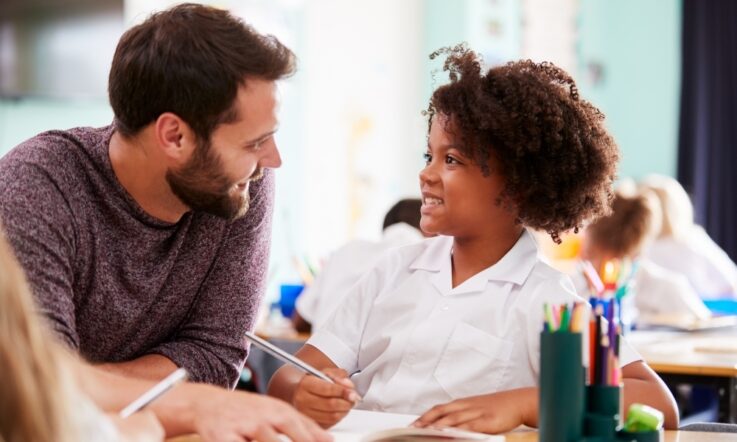Thanks for listening to this episode of Teacher Staffroom, where we catch you up on the latest evidence, insight, and action. I'm Rebecca Vukovic.
In today’s episode I’m shining a spotlight on reading, as it’s been a topic covered quite a lot on Teacher recently. From encouraging students to find a love of reading, to ensuring they have access to a wide variety of texts, to the books children borrowed most frequently from libraries in 2020 – there is so much to squeeze into this Teacher Staffroom episode. I’ll be posing questions throughout, so as always, feel free to pause the audio and consider the questions either by yourself or perhaps with some colleagues. Let’s jump in.
The first piece I’d like to share comes from South Australia. I sat down with Christies Beach Primary School Principal Catherine O’Dea to chat about why encouraging students to develop a love of reading is the key aim of her school’s improvement plan. Catherine shared with me some of the key strategies she’s implemented across the school to encourage reluctant readers, including categorising books in the school library to appear more like they would in a bookstore, according to areas of interest rather than simply by the author’s last name. She’s also worked hard to ensure every classroom in the school has at least 100 books, so children have access to books every single day. Catherine also makes a point of ensuring she models reading for pleasure to the students at her school. She says: ‘Every assembly I read a book to the whole school and I expect all of our teachers to be reading aloud to our kids every day.’
Here are some questions to think about:
As a teacher, how do you work to instill a love of reading in the students you teach? In what ways do you promote reading for enjoyment?
Another interesting piece we published this month looked at new data on the books most frequently borrowed by children and young people in libraries in 2020. The 2021 Civica Libraries Index provides insight into the books children are reaching for most frequently. Civica analysed data from 104 regional and metropolitan libraries in Australia and New Zealand, which included 34 million loans between April 2020 and March 2021. Their analysis has revealed the most popular books in various categories – from children’s books to young adult novels.
Interestingly, the data this year shows that the COVID-19 pandemic had an impact on our reading habits, with a steep increase in e-book loans observed by libraries. Civica notes that Ipswich Libraries in Queensland saw an 80 per cent increase in e-audio downloads, 67 per cent increase in e-book loans and 120 per cent increase in e-magazine downloads.
ACT Libraries observed a 35 per cent increase overall in e-book and e-audio loans across their nine libraries, and Hutt City Libraries in New Zealand witnessed a 41 per cent increase in e-book loans and 40 per cent increase in e-audio loans for their eight libraries.
Make sure you check out the article on the Teacher magazine website to find out which fiction texts were borrowed most frequently by children and young adults. You’ll find a link to the article in the transcript of this podcast.
This month we published two infographics on the topic of reading and literacy. The first looked at the latest data to come from the Trends in International Mathematics and Science Study (or TIMSS), where Year 4 principals were asked to report how many students in their school could do foundational literacy skills such as ‘write their names’ when they began their first year of primary school. We looked at how Australian data compare to the international average.
The other infographic I’d like to mention draws on data from the Programme for International Student Assessment (or PISA) survey that looked at the attitudes held by 15-year-olds on reading. An Australian Council for Educational Research Snapshot report has analysed these attitudes, and looked at how they differ between girls and boys, Indigenous and non-Indigenous students, and the most disadvantaged and least disadvantaged students. You’ll find both of those infographics on the Teacher magazine website in our archive.
And my final piece on the topic of reading focuses particularly on teachers and their own professional reading. This month we received a contribution from Victorian teacher Steven Kolber and researchers Dr Keith Heggart and Dr Sandy Nicoll who discuss the research-based reading group #edureading and how it brings teachers and academics together on Twitter to engage in research in a meaningful way. Here’s a quote from the article where the authors explain the goals of the group:
The explicit goal of this group was on engaging with research, in the form of various peer-reviewed, educational articles and topics as determined by the #edureading group themselves. This was not intended as an empty signifier, but rather as a means to empower and upskill teachers. It recognised that in future many of the group’s participants might take up leadership positions where, it was envisaged, this detailed knowledge and use of research would be of greatest use, or continue their further education spurred by the camaraderie and inclusive nature of the group. This in many ways challenges the common practice of educators feeling as though they work in silos within their own classrooms and institutions.
Here’s something to think about:
As a school leader or teacher, how do you keep abreast of research on effective teaching practices? Is this something you share with your colleagues? As a teacher, how confident do you feel to analyse and interpret educational research? Have you used social media to connect with other educators to discuss educational research?
Moving on now, I thought it was important to share some of the details of an Ofsted rapid review of schools in England. The review found that sexual harassment, including online sexual abuse, has become ‘normalised’ for children and young people and so commonplace for some that they see no point in reporting it to teachers and school staff. This month we published both an overview article and an infographic using data from the report.
The inspection team visited 32 schools and colleges and spoke to more than 900 children and young people. They then surveyed just over 800 of the students, aged 13 and above, about the ‘prevalence of peer-on-peer sexual harassment and sexual violence, including online, in their lives and in the lives of their peers’. They also spoke to school leaders, teachers, governors, partner agencies such as the police, parents and stakeholders.
Here’s a quote taken directly from the review:
It is a concern that this review has identified that many instances of sexual harassment, including the pressure to share nudes and the sharing of youth-produced sexual imagery without consent, are going unrecognised or unchallenged by school staff. We are especially concerned that for some children and young people this is so commonplace that they see no point in raising it as a concern with staff.
I’ve included a link to the full report and the recommendations in the transcript of this episode for listeners wanting to learn more.
And finally, this last piece I wanted to highlight is one we publish each year around this time – it’s all about preparing your tax return for the 2020/21 financial year. Check out this Q&A with the Australian Tax Office on what to keep in mind, and examples of what you can and can’t claim for. It includes information on tax claim options for educators working from home, how to claim for professional learning that you completed online, and some of the most common mistakes made by teachers and educational professionals when lodging their tax return each year.
That's all for this episode, and you're now all caught up on the latest evidence, insight and action. Before I let you go, I thought I’d give you a bit of a sneak peek of a podcast special we have coming up next month. Ahead of ACER’s Research Conference in August, I sat down with Professor Rich Lehrer from Vanderbilt University to discuss his research that explores science and mathematics education for elementary school students in the US. He also gives listeners a taste of what he’ll be sharing at the conference and why he decided to name his keynote address ‘Accountable Assessment’. You’ll find this episode and all the podcasts we publish on all the major platforms, including Spotify, so follow our channel to make sure you never miss an episode.



